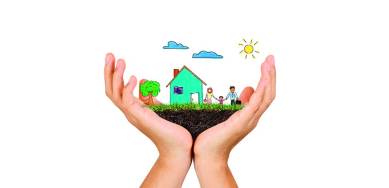Back to Basics: Lessons to be learned in returning to our roots
There are lessons to be learned and joy to be had in returning to our roots and living a life of mindful consumption.

It was a few months post-baby that I calculated that his diaper consumption must have made a little hillock in a landfill somewhere. It was also when talks of climate change and global warming had reached their peak and there was a sense of alarm. If planet earth were the stock market, it would have crashed then. Since I had already made the baby, I couldn’t be one of those people who said that I wouldn’t have children because I want to save the planet. But I decided one thing — I will use less, want less and recycle more. I think I have stayed true to that resolution for the most part. I rarely shop (not for clothes, shoes, accessories, belts, bags). Everything I own is old or gifted or handed down. Even when I travel abroad, I end up going to thrift stores if at all. I buy most books for my son Re from second-hand stores or garage sales. I often wish that one could recycle uniforms and books in schools, too, but when I bring it up, other parents roll their eyes. I buy groceries because we have to eat; occasionally, I buy treats for us, but there is always a mindfulness about it.
My son has grown up almost entirely on recycled clothes and shoes. Most of his toys are recycled, although birthdays go a little out of control with people buying random presents that, sometimes, I have to find ways to recycle. I have some mindful and generous friends who keep aside old clothes, shoes, toys, board games, puzzles and raincoats, etc. for Re. He doesn’t know that shopping is a luxury, and, till today, we haven’t actually gone shopping for things — except perhaps to a garage sale for books. This year, on my birthday, I asked my friends not to buy me gifts, but give me something old, something they might have outgrown. It was beautiful, the way everyone responded. It is catching on.
Now I give stuff to NGOs occasionally, but if there are things that I would like to set free (I don’t like the word donate), I make a list of people, call them, and ask them if they would like a pair of sneakers, books or floats or anything in good condition that my child or I may have outgrown physically or emotionally. It takes work, but it is infinitely more rewarding. Likewise, when I want something specific, I ask for it. When I am tired of my stuff and want new stuff, I have no shame in asking people for hand-me-downs — ripped jeans, jackets, saris, kurtas, bags, embroidery books, knitting needles, yarn, whatnot. And people are always generous. I have a circle of friends I regularly do barters with and I will recycle anything and so will the child. This is the nice thing about making art. Everything finds a place.
The worst thing for the environment right now is not straws — it’s greed and random consumption — to always want more, own more, dump more.
I had a green childhood. Our school satchels were made of thick canvas/cloth and we had the same one for several years, frequently stitched up. My textbooks were kept aside for my siblings. Our tiffin boxes were always steel. We drank water from taps. For notebooks, we used brown paper, home-made labels and home-made gum paste. All our clothes were stitched at home and everything we ate was made at home. Except Parle G and sliced bread (which made a guest appearance once in a while). We walked to school, we played with friends, we hardly had toys. Once a month, my father or the help would go to Pai stores with a list and groceries would be brought home in a large jute bag. Tins had to be sent for oil, ghee. Everything else came in recycled brown paper bags. Rice was bought from farmers (my dad always knew someone) in large 20 kg gunny bags. The only plastic that came into the house was the milk packets of Warana milk that Amma started buying once she found that our milkman was giving us more water than milk from his canister. She would wash and dry each packet. These were sold once a month for Rs 7 a kilo to the same guy who bought our old newspapers. Empty pages of our school notebooks were collected and bound into “rough books” in the school holidays. Uniforms had hems that if unfurled, would run up to our ankles (just in case we got my father’s height).
Fruit was not a staple, but we occasionally ate guavas, bananas, oranges, watermelons or anything seasonal. Once a year, a crate of mangoes arrived and we had no upper limit on how many we could have. It was real indulgence. We had no gadgets (except a Sumeet mixer and a Philips radio). No one spoke about global warming. It wasn’t a thing.
I am saddened by the world we are leaving for our children. And each time I look at my garbage bin, I am saddened even more. Especially when I multiply that amount by 1.2 billion people.
Two years ago, Re was picking up litter in Landour and he said something that I will never forget. “Mamma, when humans don’t want things, they throw it on Mother Earth. It’s like they don’t want garbage in their house, but they are okay with throwing it on Mother Earth’s garden. At this rate, all that garbage will become another planet.”
Maybe it will.
Lalita Iyer is a Mumbai-based writer. Her new book, Sridevi: Queen of Hearts (Westland), is out in September.